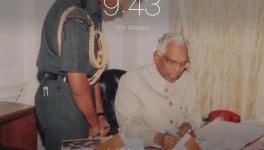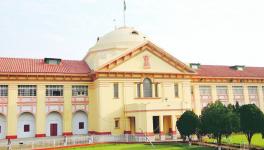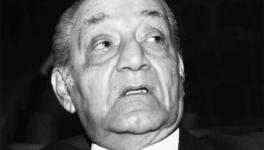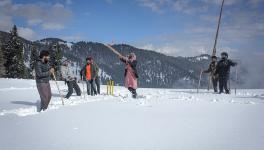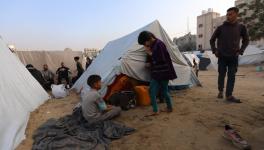Ban on Cross-LoC Trade is Like Calling Off Polls Because Black Money is Being Used: Haseeb Drabu
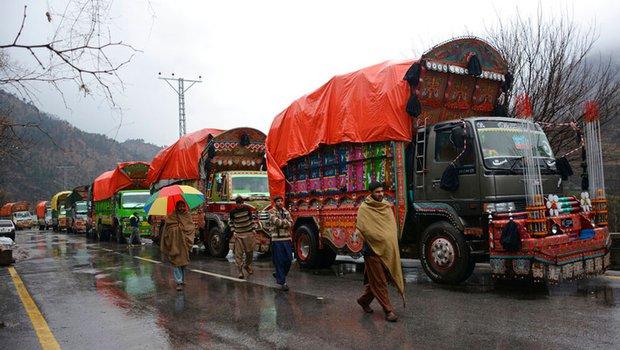
Image Courtesy: Telegraph India
Former Jammu & Kashmir Finance Minister, Haseeb A Drabu, who recently left the People’s Democratic Party, feels the Centre’s ban on cross-border LoC trade will hamper confidence-building measures as well as interaction between people on both sides of the border. Drabu, who was said to be in the thick of talks that led to the now broken PDP-BJP alliance, spoke to Newsclick in Srinagar, about how a better designed cross-border trade policy is the need of the hour. Edited transcript of a video interview:
ZS: After the Amarnath agitation of 2008, Muzaffarabad Road was opened for LoC (Line of Control) trade. In spite of tough formalities and trade limit to 21 items, this trade had reached Rs 5,000 crore in March 2018. Therefore, by stopping this trade, isn’t the government of India increasing the problems and sufferings of the people of J&K?
HD: The issue is that the cross-LoC trade was not essentially an economic decision, it was a political decision, which is why you see that this trade was monitored or regulated by the Home Ministry, not by the Commerce Ministry. There were serious issues with this trade, right from the word go. It is a CBM (Confidence Building Measure), but it's also at some level a very important initiative to free up the economy of J&K. Not only this, I thought it was also a much larger initiative which could be replicated elsewhere in the country.
I think the basic confusion was about trade, that is it between India and Pakistan. If at all, one should define it. It (the trade) essentially boiled down to being a barter trade to the extent that exports were not called exports, they were called ‘traded out goods’, imports were not called imports, they were called ‘traded in goods’. So, the design of this entire trade was flawed and there was resistance both from the governments of India and Pakistan. Because I was involved with the whole process at some point of time and as soon as the trade was launched, I had written that time itself that this is not going to go very far… Trade in Jammu was actually far more buoyant in helping the economic system, more than even Muzaffarabad. So, it was not like it was specific only to the Valley.
The real issue was that this was leading to interaction between the people on this side and on that side. That was a very important thing. Once that happened, basically there was a social connect. There are people I know whose relatives are across the LoC, but that's a social connect. How do you transform a social inter-connectedness into a relationship, a business relationship? Had it grown it would have transformed itself into inter-dependence between the two regions, you would have had institutional relationships, you would need bank facilities, you would need all kinds of things…. And at some level, the two parts of J&K would have come closer and that would have helped the resolution of the larger issue, which has been there for the last 70 years.
So, while symbolism is important, the real issue was that this trade lacked substance, and to take a decision of this kind, all of a sudden. I don't even think it has been banned, just suspended. I think this trade needs to be reworked, given a certain stature because you can't run what is called a blind barter in today's day and age.
So, is barter trade legally and economically viable?
Well, the world started with barter trade. It's not about whether it's viable, it’s about how do you want to build this trade? When you look at India-Pakistan trade, it is done in ACUs (Asian Currency Units). Now neither country wants to do that, because it involves the issue of sovereignty. If you say that this is an import from that part of Kashmir, then you're acknowledging implicitly that that is not your territory. Right? So there are serious issues here, but there are ways.
If there is a will, there is a way of bypassing all this. In fact, I wrote a piece in 2014 also, on how one can design this trade, how one can introduce banking relations and all that, because while it started with barter, that was important, it was a good step, it needs all kinds of support, banking support, communication support etc.
Suppose you're a trader from across the LoC and I’m a trader here. If between the two of us, there is a dispute, who will resolve it? There has to be a dispute resolution mechanism, some legal framework has to be evolved. So, all these networks are important, but the important point is, as you said, the trade had grown to Rs 5,000 crore, which means there is a business waiting to be done. And when you are a landlocked economy, like we are, then these opportunities are very important, opportunities to grow the economy of J&K and not be dependent on a set of investments coming in, whether it’s from the government of India or elsewhere.
After the major losses Kashmir faced during the 2014 floods, a seven-month-long shutdown in 2016, and the recent 48-hour ban on highway traffic, how do you think this LoC trade ban will affect the state’s economy?
It is not going to have that huge an impact, because Rs 5,000 crore, when you look at it from the totality of state domestic product and all, it’s not that large a number. But it surely will shake confidences. To arbitrarily call it off on the pretext that there is hawala money coming in and all that, which was the first reaction of the trade from Amritsar and Lahore, both said hawala money racket is happening here.
My argument is, may be there's a problem, but if the government of India believes there is a problem of narcotics, there is a problem of guns, or whatever, then that reflects that there’s a problem with the modality of trade. Right? It is like saying, for instance, that in elections black money is used, therefore I’ll call off elections. You don’t call off elections, you change the system. Bogus voting, you’ve made EVMs, right? So you want to make the system more transparent.
So, the solution to this is that let us design a system that will not allow the problem. If you have no regulator, obviously there’ll be a problem. I was finance minister here, and I am aware of the fact that a lot of this trade was driven by mafia from outside the state. So that is where I think some revision needs to be done.
Cross-LoC trade was started as a CBM between India and Pakistan, and from both sides, trade was happening. Political analysts believe this (the ban) was more a politically-driven decision rather than an economic decision.
Of course, there is no question about it. Look, to start with it is a political decision also, to set up the trade. Let us face that fact, it was a political decision. What is a CBM? It was political. But then it got a life of its own and it reached Rs 5,000 crore despite neither government of India nor government of Pakistan willing to engage with this. So, there is a business problem. It’s of course a political decision. But what is even more significant is that this is coming in the context of the renewed move to abolish 35-A. If you look at the design of the trade, and that is where I think rational arguments need to be made, rather than breast-beating and chest-thumping, that's not going to work.
The reason why this is becoming a concern, a greater concern rather, is that this trade was defined for: a) state subjects and b) for locally produced goods. Over time locally produced goods didn’t remain. We started exporting bananas. Bananas don't grow in Kashmir. So, a trader was getting bananas and then supplying them, which was really not what it ought to have been, but it was there. This was raised and discussed also.
The second part is, outsiders were involved, but invisible. They were partners. Now this is, I think, also a rounded attack on that part. Look 35-A is like a tree, which has grown around, it has various branches. So, I see this more as trimming those branches to kind of align it, because it is spread all over the place. In the last 70 years, 35-A has gone in different directions. So, this in the context of 35-A, makes it even more political and even more dangerous.
Is there any other way or alternative that India and Pakistan can choose as a CBM?
Well, that depends on the political executive. I don't think this is the right time to even discuss those because the kind of stress that exists between the two is large and that too at election time.
So let's also see this way, that these are issues that are raised uring elections, but this itself could be a large thing, which you know can be designed much better, much more robustly without infringing on the sovereignty or the claims of the two sovereign nations. We could look at, you know, at some level, joint policy formations or disaster management.
There are two great areas. For instance, when earthquake struck the Uri side, the first reach-out was from across the LoC because there is a geographical link. Suppose there is an earthquake in Kerala or Bombay, it may not affect you. But if there is an earthquake in Muzaffarabad, it is bound to affect you. So, if could do join disaster management policy. It’s non-controversial, it’s humanitarian. You could look at joint regulatory forces in agriculture, in tackling disease. Now, a disease that strikes an apple in Pulwama, in Sopore, is likely to get across the LoC also. So, you do these non-contentious issues, build confidences.
The National Investigation Agency claimed this trade was misused. What could have been done to prevent this?
Five basic networks are needed. Make the trade bankable, then you’ll know. Communication network. You must be able to communicate transparently, right? You must have that regulatory framework. Who is regulating the trade? A legal dispute resolution mechanism. So, these things must be put in place, if you want misuse not to happen.
But you didn't do that for a variety of reasons. Very lazy, lethargic thinking… If it’s thought through and we put in place a set of measures, then this kind of misuse won’t happen. If you’re saying, and I read this somewhere, that under-invoicing is happening. I request the authorities to show me one trade in the world between partners where under-invoicing does not happen. But you don’t stop international trade because under-invoicing is happening. You put a penal system into that. So depending on the nature of what they have found (no evidence has come to ground at the moment) if you feel that there are issues there, then each can be addressed by a proper systemic framework within which the trade should operate.
If the allegations made by NIA are true, do you think India can afford to go ahead with LoC trade?
Look, it's not about really allegations. The point is, if there is a concern, the government of India has huge policy wings, the government of Pakistan has huge policy wings, they can sit down and work out a framework.
Don't you think it's in a way good that former Kashmiri militants who have settled in Pakistan are taking to business instead of picking up arms again?
I don't see militants entering this trade. Nor would I want to see this as a rehabilitation measure. I see it much more than that. There is a social connect, how do I deepen the connect? I have a cousin across, that is limited, that’s a family thing. Now then there is a relationship, but can I take it to a partnership? Can I build it further? How do I do more business and get to know people? The chamber of commerce will interact, the banks will start interacting, regulatory fellows will start interacting. So, you become like a normal neighbouring thing… I would much rather see it as robust. As I said, you can conceive of this kind of trade in other states as well: Tamil Nadu-Sri Lanka, West Bengal-Bangladesh, Gujarat-Sindh, you know, that kind of stuff. So, I would much rather see this as a measure for regional integration than regional cooperation.
What was the communication between PDP-BJP government and the Centre on LoC trade?
I think there were two or three initiatives. One, of course at a personal level, there was which I'd been involved in, I’d sent letters to P Chidambaram when he was finance minister, we had also represented in central government to make it formal and whatever, but, there were, I remember, from the industries department, a number of measures that were sought. One of them being that we should increase the number of commodities from 21 to whatever, we should try and formalise the trade. So these were some incremental steps that the government at that point had suggested.
Overall, business communities in the state are under the scanner. How do you see it impacting the economy and politics of J&K?
Well, it's unfortunate that the business community gets targeted. As it is, it's a very small business community. So, if that gets enmeshed into this kind of thing, then obviously it is going to impair the economy. As it is, out of 365 days, probably business doesn't function for more than 200 days, rest are all hartals or whatever. So, there is a lot of pressure on business. And this is certainly not because of LoC trade being suspended, but overall, the way things are going. What happens is, it starts impairing the business networks. Now, if you are a businessman, you have 20 different relationships with people, some in Bombay, some in Delhi, some whatever. And then you come under the scanner. You may come out clean in two months’ time. They may find nothing. But it will impair all these relationships, so you will have to rebuild that, and that is a loss. It just breaks the business networks, because it makes them suspect.
Don’t you think it's creating a bad image of J&K trade before the rest of the world?
I don’t about the rest of the world. Yes, it is creating (a bad image). But I must also say that the trade itself needs to look inward. I mean, every now and then they are at the forefront of politics. I kept telling them for three years that your job is doing business, do business. Why are you enmeshing yourself into politics? But then there are grey areas. You know, you are per force circumstantially led to do certain things. I think it's important for them to also see what they are most interested in. So, it is easy to look at it in black and white, but it is grey. I would also urge the local businesses to take stock of where they are going, what they want to do. If they want to focus on pure (business), that’s what they should do.
Get the latest reports & analysis with people's perspective on Protests, movements & deep analytical videos, discussions of the current affairs in your Telegram app. Subscribe to NewsClick's Telegram channel & get Real-Time updates on stories, as they get published on our website.









